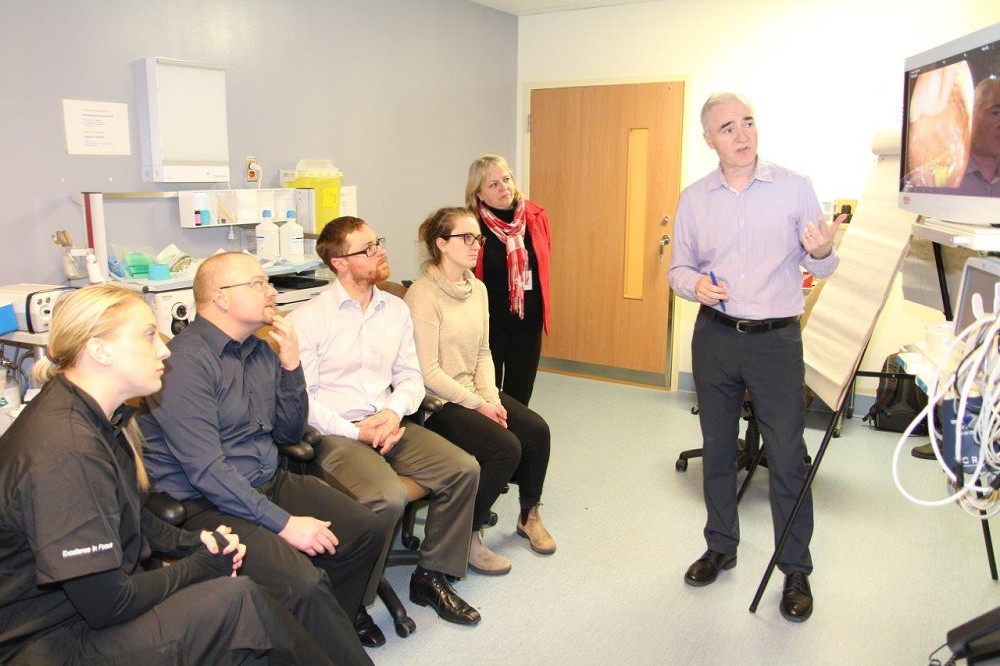Local Surgeons Improving Colon Cancer Screening for Northwestern Ontario Patients
by Katherine Mayer
 Led by the Canadian Association of Gastroenterology, the Skills Enhancement for Endoscopy (SEE) training program provides colonoscopy skill improvement for practicing Canadian endoscopists. The program allows for surgeons and gastroenterologists working in Northwestern Ontario to better prevent, detect or remove cancerous polyps in patients in our region.
Led by the Canadian Association of Gastroenterology, the Skills Enhancement for Endoscopy (SEE) training program provides colonoscopy skill improvement for practicing Canadian endoscopists. The program allows for surgeons and gastroenterologists working in Northwestern Ontario to better prevent, detect or remove cancerous polyps in patients in our region.Compared to the rest of the province, Northwestern Ontario has high rates of colorectal cancer. The need for effective screening methods is crucial. Fortunately, Thunder Bay and regional surgeons and gastroenterologists have been involved in a Skills Enhancement for Endoscopy (SEE) training program led by the Canadian Association of Gastroenterology.
“The purpose of SEE training is to provide colonoscopy skill improvement for practicing Canadian endoscopists,” stated Dr. Donald MacIntosh, National Co-lead for the SEE Program. “We have recognized with quality assurance that we need to improve the quality of colonoscopy across the entire country. These SEE courses are designed with that purpose in mind.”
A colonoscopy, a type of endoscopy, is an examination of the lining of your rectum and colon using a long flexible tube with a camera on the end which looks for precancerous growths, called polyps. Dr. William Harris, Endoscopy Lead for Thunder Bay Regional Health Sciences Centre, explained how colonoscopy can be used in a number of settings. “Patients with worrisome symptoms, such as rectal bleeding or a change in bowel habits, should undergo colonoscopy, as should patients with a first degree family history of colorectal cancer. A positive Fecal Occult Blood Test (FOBT) would also result in a patient requiring colonoscopy,” explained Dr. Harris.
Every year, over 9,000 Ontarians will be diagnosed with colorectal cancer. Dr. MacIntosh encouraged, “Detection of polyps at an early stage, when complete removal is an option, can result in prevention of colon, rectal and bowel cancers.” The SEE course is important as it fundamentally changes how to perform endoscopy. Dr. Harris added, “The course involves intensive hands-on instruction by national experts. By understanding how to perform very subtle maneuvers, endoscopy can be safer and more comfortable for patients, and ultimately more effective at detecting cancers and pre-malignant growths at an early stage.”
If colorectal cancer is found early, it is 90% curable. Building colonoscopy skills will bring better care to the patients of Northwestern Ontario. Dr. Harris explained, “Given the geographic challenges of our region, it is exceedingly important that highly qualified endoscopists are available in every community offering cancer screening and colonoscopy in order to prevent, detect or remove cancerous polyps in our patients.”
Men and women aged 50 – 74 should complete the take-home colorectal cancer screening kit (FOBT) every two years. To receive a take-home kit, you can visit your healthcare provider, Screen for Life Mobile Coach, or call Telehealth Ontario. For more information about colorectal cancer screening, visit www.tbrhsc.net/screening.